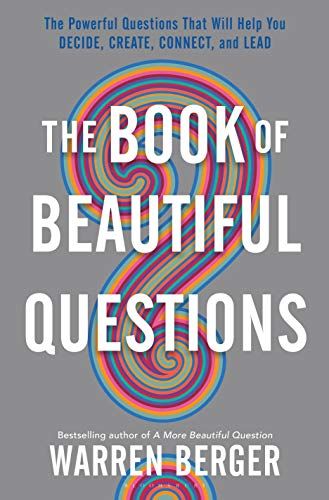“Questionologist” Warren Berger teaches you to ask the right questions at the right time to facilitate your relationships, your career and your self-growth.

Ask Fearlessly
“Questionologist” Warren Berger proffers essential queries that fulfill four “beautiful” functions: to help you “decide, create, connect and lead.” His “bias-busting” questions will challenge your assumptions and shift your perspective. Whether you are trying to make a tough choice, generate fresh ideas, enrich your relationships or become a visionary leader, Berger helps you know which questions to ask.
Better Choices and Results
Beautiful questions redirect your thinking, broaden your outlook, overcome biases and facilitate creativity. Berger asserts they guide you to better decisions, generate innovative solutions and forge stronger connections.
The simplest and most powerful thing that happens when we ask ourselves questions is that it forces us to think.Warren Berger
Berger warns that fear makes you unwilling to expose your ignorance. The “trap of expertise” lures you to believe you don’t need to ask questions. Develop self-awareness to challenge your biases. Hubris can lead you to believe that your biases are facts. Claiming you lack time helps you avoid questioning your choices in favor of quick decisions.
Instincts Are Unreliable
Intuition is vulnerable to innate biases, skewed perceptions, blind spots and undue caution. Questioning nurtures clear thinking and more equitable decision-making.
The path to better decision-making begins by questioning one’s own beliefs, biases and assumptions.Warren Berger
Berger understands that deliberating and considering evidence takes time that most people prove unwilling to invest. The tendency to credit input that confirms what you already believe impedes sound decision-making, even if it saves you time. Always question what your gut tells you.
Defensiveness
Standing up for your beliefs – innate defensiveness – thwarts open-minded decision-making. Counter your desire to be right by embracing “intellectual humility”: an objective approach to new ideas and evidence. Regard your and other people’s assertions with skepticism. Ask, “Does this evidence come from a solid source?” and “Is there an agenda behind it?” Berger urges you to consider, when receiving input from others, “What are they not telling me?”
Avoid framing decisions as binary choices with yes or no answers. Reframe them into open ones to provide more options to consider. Generate at least three options – including a positive, a moderate and a negative scenario – to stimulate your thought processes.
Fear of the Unknown
Fear of negative consequences, or “negativity bias,” can lead you to the safest, but perhaps not the best, most productive or most insightful solutions.
In the jungle or in other life-and-death situations, avoiding risk may make sense, but in business, in one’s career or even just in terms of living a full life, it can severely limit possibilities.Warren Berger
When fearful, Berger suggests asking, “What is the worst that can happen?” Visualizing the worst-case scenario prompts you to specify your fear and often alleviates its effect.
Passion and Purpose
Questioning helps you ascertain your priorities and identify your purpose. To find your fulfilling goals, Berger recommends asking, “What are my signature strengths?” and “What are my superpowers?” To find your passions, consider, “When was I truly happy and why?” and “What activity or theme do I keep coming back to?” To solve a problem, ask how you can apply your strengths and abilities.
Creativity
Today’s businesses must innovate to remain relevant, and so value creative skills. Berger regrets that many people ascribe to the myth that a person is either creative or not. In truth, he wants you to know, creativity is not an innate skill, but an outlook – a way of looking at your surroundings with curiosity, spotting a problem or opportunity, and applying your ideas to work it through. Asking the right questions activates your creativity.
Trying to produce creative ideas is daunting. Berger cites David Burkus, the author of The Myths of Creativity, who believes most creative breakthroughs come from making connections between existing ideas. Ask, “What stirs me?”; “What bugs me?”; or “What’s missing?” A frustrating problem or situation may capture your imagination and inspire you to find a better way.
Creative Gaps
Viewing something familiar in a new light sparks creativity. Ask, “What might I notice if I were encountering this for the first time?” Berger cites education professor KH Kim, who suggests four “why” questions to increase creativity: “Why does this problem matter? Why does it exist in the first place? Why hasn’t someone solved it already? Why might that change now?”
If you can work your way through the difficult middle stages of creativity, confidence and enthusiasm [tend] to return as you draw close to completion.Warren Berger
Capture an elusive idea by writing it down, humming a bar, making a drawing or talking about it, regardless of whether your idea occurs in the beginning, middle or end of your project. Developing an idea takes staying power. At times, you’ll get stuck or become worn. When you feel tempted to quit or to take on a new project, ask yourself, “Do I have what it takes to make the idea actually happen?”
Relationships
Authentic questions nurture truer, more meaningful, relationships. Instead of asking, “How are you?” Berger recommends you invite people to share experiences: “What’s the best thing that happened to you today?”
Listen attentively. Don’t interrupt. When you’re tempted to talk, ask yourself to WAIT, an acronym that stands for “Why am I talking?”
Staying quiet long enough to let the other person fully express themselves is key to good listening.Warren Berger
Offering advice is a roadblock to selfless listening and useful questioning. For example, instead of asking, “What did you do wrong on this project?” try, “Take me through what happened on this project.”
Humble Inquiry
Offer a humble inquiry to identify employee difficulties and frustrations, offer support and promote trust. Ask, “Help me understand…” or “How can I help?” Focus on the recipient’s needs and challenges.
It is becoming increasingly clear that the best leaders are those with the confidence and humility to ask the ambitious, unexpected questions that no one else is asking.
Warren Berger
Promote curiosity, analysis and inquiry to inspire an influx of great questions.
Emotional Intelligence
Berger writes with a light touch and strong emotional intelligence. This is no mere self-help book, though Berger’s ideas do suffer from a one-note approach you might associate with self-help. For the author, every problem has a solution question awaiting. His questions prove insightful, though, and will inspire you to generate new insights of your own. Berger uses questions as a foundation for self-improvement, improved collaboration and improved leadership. This is a quirky approach to those goals, but Berger – whose career is all about questions – makes it work.
Warren Berger also wrote A More Beautiful Question and Glimmer.













